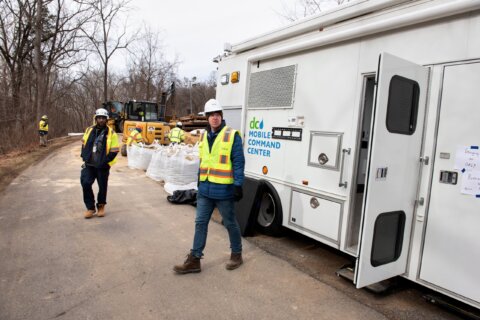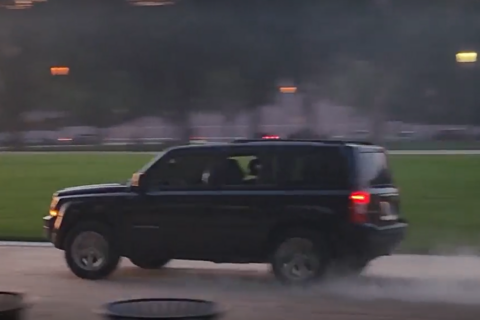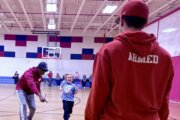For years, the education group Washington Urban Debate League has worked to bring the elite “sport of the mind” to D.C. public school students.
It’s an effort that relies on the work of dedicated staff members and volunteers. But for some, monthlong delays in processing by a city vendor have created a big backlog in screening potential volunteers, prompting some volunteers to lose interest and forcing some after-school programs to scale back their offerings.
“I have a line of probably 15 or 20 volunteers … they’re just wasting away and in line, waiting to get processed. And they’re drifting off,” said David Trigaux, the director of programming and development at the Washington Urban Debate League in an interview with WTOP.
As of May 19, 2021, all D.C. Public Schools employee, volunteer and contractor candidates have to complete a clearance application for child protection registry screening, and all candidates are automatically run against a sex offender registry.
However, processing delays have slowed the hiring process. As of Oct. 18, 133 staff members across 71 schools are still awaiting clearances.
The backlog has spurred action by the city, which announced last week that it will begin working with a new vendor starting Nov. 1. D.C. schools didn’t respond to a question about whether the new vendor would replace the old one or the two would coexist.
City Administrator Kevin Donahue told council members that the shift should reduce processing time for candidates.
The announcement came as Ward 4 Council member Janeese Lewis George and several council colleagues urged schools Chancellor Lewis Ferebee to address the issue, citing the experiences of multiple before and after-school providers, some of which said processing delays for staff and volunteers have reached up to two months.
For Trigaux, the delays are slowing down the hiring process.
“It is depriving students of enthusiastic adults trying to help them,” Trigaux said. “It impacts any volunteer that wants to work in a school. Their clearances are generally going through the same process.”
The Washington Urban Debate League works in Alexandria, Virginia, in Montgomery and Prince George’s counties in Maryland, and more than 20 other charter networks in the area, Trigaux said. He said in every other jurisdiction, average clearance time is about a week or two.
Trigaux has seen some people get cleared quickly, while others who submitted applications in July or August are still waiting for a response. There doesn’t seem to be a clear reason why, he said.
Ryllie Danylko, a policy analyst at DC Action for Children, said if there have been delays in the past, they weren’t extensive. The DC Out-of-School Time Coalition, organized through DC Action, represents 60 organizations that provide after school and summer programs to kids across all eight wards.
DCPS says it has a goal of processing volunteer applications within 14 days.
“Some programs have had to limit the number of students that they serve, just because they don’t have enough staff, because the staff members they did hire are just not hearing back about whether or not they’re cleared to work in schools,” Danylko said. “They just don’t have the people to serve students.”
In an emailed statement, the school system said it’s “working closely with the District of Columbia Department of Human Resources and the Child and Family Services Administration to execute a comprehensive background clearance procedure of every applicant and fulfill the required Child Protection Registry check.”
It also said the pandemic “has severely impacted the background clearance procedure for many DCPS applicants” looking to fill before and after care positions.
To help expedite the process, the school system said it will direct funds to the Child and Family Services Administration to expand capacity, as well as work with new vendor First Advantage, which will accept applications from clearance candidates and vet them for completion.
Ferebee also wrote he hopes transitioning to a new drug testing vendor starting Nov. 1 could help alleviate delays.
In response to Lewis George’s letter, Ferebee said that reasons for the delayed processing times include:
- The CPR check is a more in-depth civil investigative process and not a simple criminal check;
- Incomplete, incorrect or illegible applications result in a failure to adhere to the 14-day turnaround time;
- CFSA doesn’t have the resource capacity to process the current volume of applications.
However, Ferebee wrote, some of Mayor Muriel Bowser’s recently announced funding for COVID-19 efforts in schools will be used to address some those issues.
But for Trigaux and Danylko, it’s unclear how quickly the changes will clear the backlog and, in the meantime, students are losing out.
“After school programs are such a critical resource for young people right now, after a year and a half of virtual school and the ongoing trauma of living through a pandemic,” Danylko said. “Students really need the academic and the social and emotional support that they get in their after-school programs now more than ever.”








